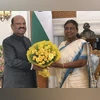The concept of "passive governor" is gone and while the elected chief minister should be the "front face" of government, the nominated governor should be in the background as a "friend, philosopher and guide" to the elected representatives, West Bengal Governor CV Ananda Bose said on Sunday.
In an interview with PTI, Bose, who was in Delhi to attend the Governors' Conference, said the governor is a custodian of the Constitution, guardian of federalism, and "not a rubber stamp".
Bose, who has had frequent run-ins with the Trinamool Congress government in the state, also delved into their strained relations.
Without mincing words, he said that he respects Chief Minister Mamata Banerjee as an individual and has professional relations with her but the "politician Mamata Banerjee" is not his cup of tea.
Talking about the Governors' Conference, Bose called it "transformational" and in line with the vision of the Narendra Modi-led central government.
"In keeping with Prime Minister Shri Narendra Modi's concept of transformational India I would say it was a transformational Governors' Conference where now we will see there will be a new rhythm for the working of the governors. A new style, a new grammar, a new chemistry between the elected representatives and the governor," Bose told PTI.
Also Read
"The governor's conference decided, endorsed by the president and others, that governors should remain as an effective link... I may use the word as a rainbow bridge between the centre and the state. In that case, the governors have to get deeply involved in the implementation of the projects and programmes meant for the good of the people," he said.
Bose said while the elected chief minister should be the front face of the government, the governor should be in the background as a guide.
"The governor should be active. The concept of passive governor has gone," he said.
"The concept of active governor is coming in. It is a very delicate exercise. Personally, I feel the elected chief minister should be the front face of the government. The nominated governor should be in the background.
"He should remain as a friend, philosopher and guide to the elected representatives," he said.
Asked if this may further fuel the debate over the functioning of governors in states ruled by non-NDA parties which have accused governors of undue interference and hindering the state governments' work, Bose said, "Debates are an essential part of an evolving democracy.That has to be welcomed. Governors' role needs to be redefined."
"A new grammar, a new chemistry is to evolve as the days pass. I think it's a healthy part of Indian democracy that the role of the governor is also discussed and debated in public. Eternal vigilance is the price of democracy," he said.
He stressed that the governor, being the custodian of the Constitution in the state, should be ever vigilant so that democracy does not die down.
"Democracy should not give way to mobocracy by political interference. That is the role of the governor," he said.
"He (governor) is an umpire in this process. He is a link between the Centre and the state. He is a custodian of the Constitution of India. And he is the guardian of federalism in this country. The governor has a role to play. The governor is not a rubber stamp," he said.
Talking about the steps taken by him in the Raj Bhavan in Kolkata, which he also discussed during the Governors' Conference, Bose said he brought in the concept of "Jan Raj Bhavan", aimed at demystification of the governor's house, and the keys to the Raj Bhavan were symbolically handed over to Chief Minister Mamata Banerjee.
He also mentioned the concept of "mobile Raj Bhavan".
"Especially during the Panchayat election, a lot of disturbance was there and violence was there in the field. I used to hit the street at 6 am. Anybody can stop the governor's motorcade and air their grievances," he said.
"It was then developed into the Rail Raj Bhavan. I used to travel in the second class AC with my staff and people could approach me there," he said.
"Similarly, when the public has to approach the governor, especially during elections when there is violence, I started the peace room in the Raj Bhavan," he added.
On the role of social media, he said governors are also trying to the extent possible to keep in touch with social media and "listen to the halftones and undertones that take place in society".
"I also had the opportunity to suggest intelligence gathering from social media. America is doing it in a big way. When we have cross-border issues with various countries apart from the systematised intelligence agencies there is a potential," he said.
(Only the headline and picture of this report may have been reworked by the Business Standard staff; the rest of the content is auto-generated from a syndicated feed.)
)